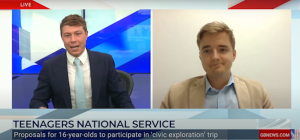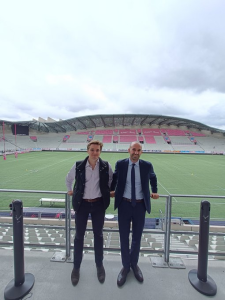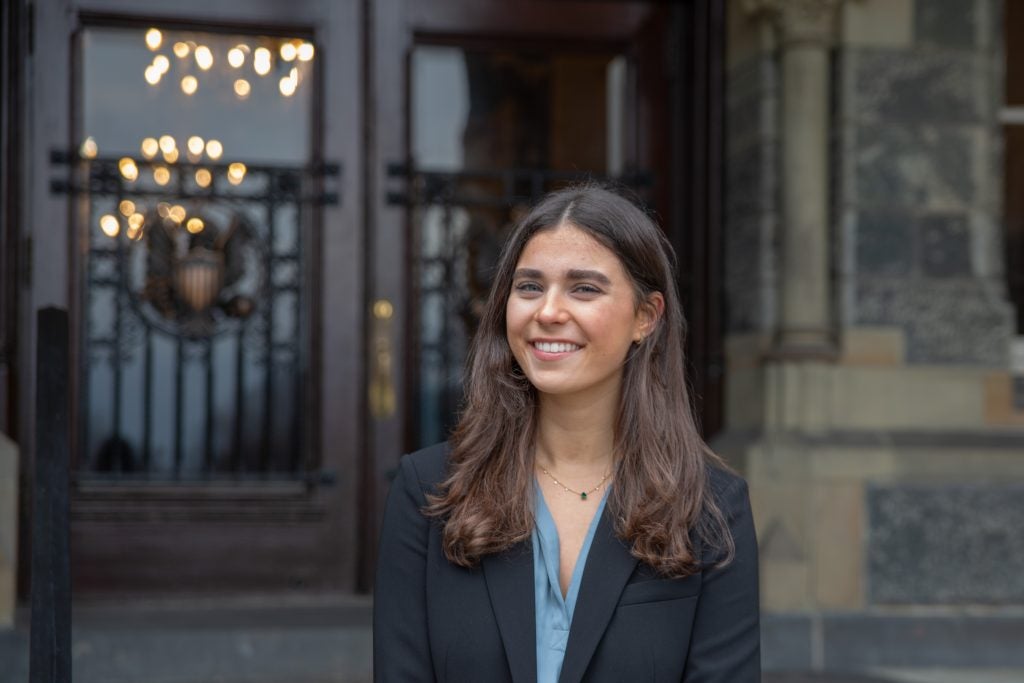Two Hoyas have been selected as 2025 Schwarzman Scholars, a program that selects outstanding future leaders to pursue a one-year master’s degree at Tsinghua University in Beijing, China in order to gain a better understanding of China and global affairs. François Valentin (SFS’18), a political analyst based in London, and Nicole Weinrauch (SFS’24), an SFS senior passionate about Middle East and China affairs, will join the program’s 150-student cohort to study at Tsinghua. Arriving from 43 countries and 114 universities from around the world, the Schwarzman Scholars Class of 2025 were selected from a pool of over 4,000 candidates.
A Franco-British Political Analyst
Valentin is a senior researcher at Onward, a leading Westminster think tank, as well as the founder of the Uncommon Decency podcast, which covers European issues through interviews and analysis. As a political analyst and aspiring diplomat, Valentin brings fresh ideas to all roles he occupies. He received his undergraduate degree in international politics and security from SFS in 2018 and a master’s degree in public policy from Sciences Po Paris in 2021.

Valentin also served as chief of staff for Benjamin Haddad’s legislative campaign for the French National Assembly, directing campaign staff in Haddad’s victorious bid to flip the 14th electoral district of Paris, previously held by the center-right since at least 1958. In a campaign where he criss-crossed the district from north to south, he pushed for a boots on the ground approach and coordinated with all of the local campaign heads. Through building trust and respect with the staff, Valentin led a large team of volunteers and staffers through a three-month long campaign that resulted in success.

Valentin attributes these skills to his time as a Boy Scout troop leader, saying, “I learned that bravado might be enough to win you the day, but ultimately in the long-run, it is the trust you build through your work and the time you spend building relations that gets you furthest. You build trust from the bottom up.”
An Aspiring European Diplomat
Through his work, Valentin has witnessed what he believes is a gap of understanding in the European Union on China’s foreign policy goals. Valentin wishes to build a better understanding of China’s needs and ambitions in order to facilitate cooperation between Europe and China where it is possible. Along with bridging these gaps between the two powers, Valentin believes that the EU needs to build its own strategic autonomy on the international stage.
Valentin attributes two moments to having shaped this belief, the first being Donald Trump’s 2016 presidential election which he witnessed while on the Hilltop. Having the unique opportunity to study the disruptiveness of Trump’s foreign policy under accomplished professors, including former secretary of state Madeleine Albright, “was a coming of age moment which exposed some of the growing fragilities of the transatlantic relationship.”
The second one, he says, was interviewing Frédéric Pierrucci, a former manager for French railway manufacturer Alstom who spent two years in American prisons, for Valentin’s podcast on European affairs. Pierrucci accuses the Justice Department of having knowingly pressured Alstom to facilitate GE’s takeover of Alstom’s strategic energy branch, showing Europe’s naïveté and weaknesses on the global stage. This is especially pertinent in an age of global polarization between the United States and China.
For Valentin, these moments illuminated cracks in the EU’s capacity as a global power, as its current relationship with the United States and China continues to undermine its political and economic power. To flesh out strategic autonomy and counter this trend, Valentin wants to make the most of his time in Beijing to deepen his understanding of Chinese strategic thinking: “I do not believe that a country’s foreign policy is purely the product of its leadership. Instead, it is largely the byproduct of a vision of the world entrenched across its society and history, with China’s current foreign policy stemming for example from its past as a regional leader.”
“I trust that [through the Schwarzman Scholarship] this exposure will allow me to understand China’s global perspective and that I can translate that understanding into my future work with the EU,” says Valentin.
Intersection of China and Middle East Studies
Nicole Weinrauch, an SFS senior, will graduate this spring with a degree in regional and comparative studies concentrating on China and the Middle East, as well as a certificate in diplomatic studies.

Last summer, Weinrauch served as a Carnegie Endowment for International Peace China Center Youth Ambassador and assisted in developing U.S.-China foreign policy initiatives and back-channel dialogues. She also has a wealth of experience interning in foreign policy organizations around the world, including as the Blavatnik U.S. Foreign Policy Intern at the Council on Foreign Relations, the David Rockefeller Studies Program, the WANA Institute in Amman, Jordan, and for the United Nations Conference on Trade and Development in Geneva, Switzerland. Her commitment to effecting change in foreign policy runs deep—in only her freshman year of high school, she presented a TEDx talk in her hometown of Singapore on breaking the silence on genocide.
Finding Passions through Global Affairs and Foreign Policy
Amidst her impressive resume of internships and research, Weinrauch found a volunteer passion at the Documentation Center of Cambodia recording the war crimes of the Khmer Rouge genocide and preparing amicus briefs and testimony for the final defense hearing at the UN War Crimes Tribunal. Raised in Southeast Asia, Weinrauch found fulfillment through her work at the Documentation Center. “My commitment stems from both empathy for the victims of a regional atrocity and an intellectual quest to engage complex societal challenges that riddle the country today,” she reflects.
Through her experience and research on the Middle East and China, Weinrauch finds that understanding the political, economic and social intersections of these regions is incredibly important for sustaining global stability. She speaks Chinese and Arabic, and hopes her time as a Schwarzman Scholar will provide her the regional expertise to reach her goals as a future foreign policy leader.
Research on a New Geopolitical Era
Weinrauch’s academic interests bring together the U.S., China and the Middle East to paint a complex picture of a shifting global order. “My research sought to re-think how the U.S. can transition from serving as the uncontested Mideast security guarantor to one of a regional integrator by leaving room for China,” she says. “To manage great power competition, the U.S. must work with China to identify key areas of interest, create flexible partnerships, and ensure a balanced contest. Collectively adapting to this evolving world order and creating policy change will define security as the two countries enter a new geopolitical era.”
Though she is yet to graduate from SFS, Weinrauch already has tremendous insight and experience to aid her time in China which she believes will be fundamental to navigating this new era.
“As an aspiring thinker in international affairs, I now seek to expand my cultural awareness of China by spending time in the country,” she says. “As U.S.-China relations are tense, I will advocate cross-cultural understanding as the key to building trust and a stronger bilateral relationship going forward.”